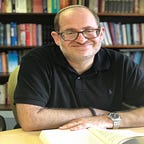#519: Always Check the Mirror
Bamidbar/Numbers 11:1
וַיְהִ֤י הָעָם֙ כְּמִתְאֹ֣נְנִ֔ים רַ֖ע בְּאׇזְנֵ֣י יְהֹוָ֑ה וַיִּשְׁמַ֤ע יְהֹוָה֙ וַיִּ֣חַר אַפּ֔וֹ וַתִּבְעַר־בָּם֙ אֵ֣שׁ יְהֹוָ֔ה וַתֹּ֖אכַל בִּקְצֵ֥ה הַֽמַּחֲנֶֽה׃
The people took to complaining bitterly before יהוה. יהוה heard and was incensed: a fire of יהוה broke out against them, ravaging the outskirts of the camp.
•••
The Israelites start complaining bitterly to God, who punishes their whining with “a fire that that raged in the outskirts of the camp.” The Hebrew term for “in the outskirts of the camp” is בִּקְצֵה הַמַּחֲנֶה ( biktzay hamaḥaneh), which can mean both “at the edge camp” and “at the extremes of the camp.” Rashi quotes a midrash that is based on this double entendre:
בקצה המחנה [AND THE FIRE … DESTROYED THEM THAT WERE] IN THE EXTREMITY OF THE CAMP — i.e. those amongst them who were extreme in baseness — these were “the mixed multitude”. But R. Simeon the son of Manassia said: it means that the fire consumed the most distinguished and prominent ones among them (cf. Sifrei Bamidbar 85 and Rashi’s two explanations of ומקצה אחיו on Genesis 47:2).
Who were these whiny complainers? They were the “extreme” people. Who are the “extreme” people? The midrash above gives two options. One is that the culpable people were the extremely…
